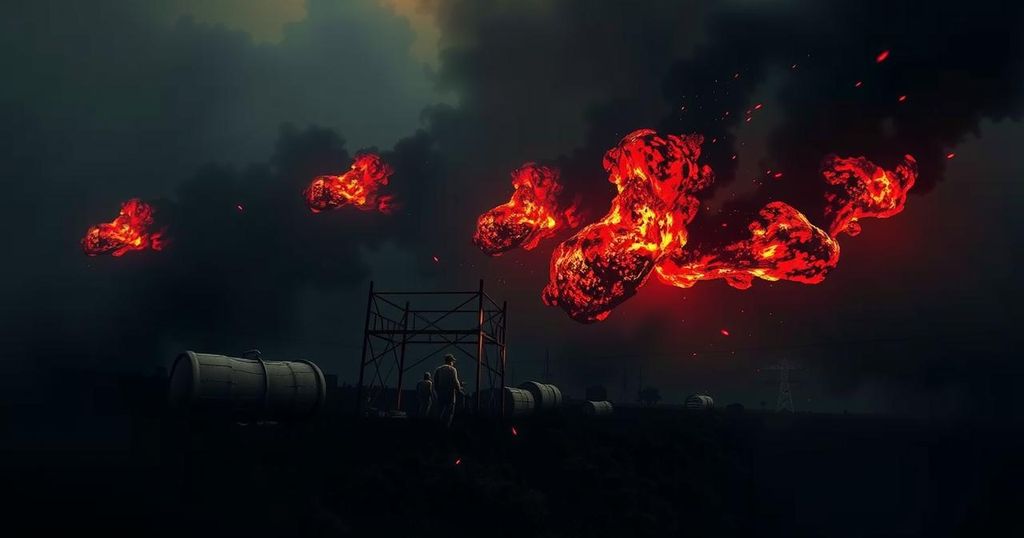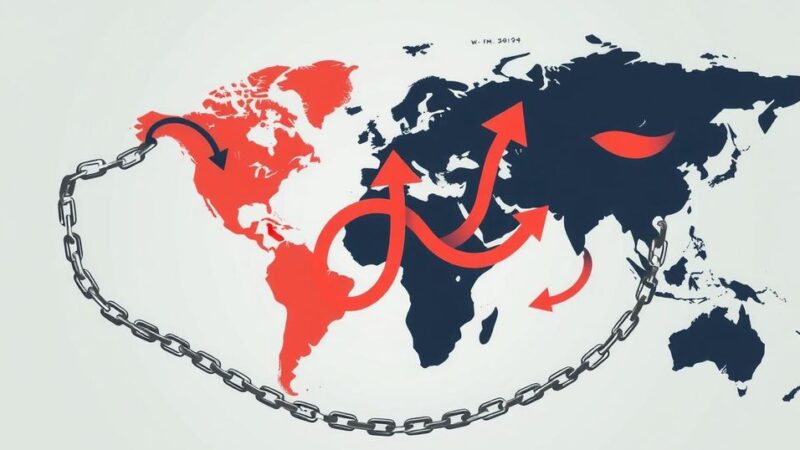Renewed violence in eastern DRC has drawn condemnation from Angola, which has been mediating between the DRC and Rwanda. Clashes between M23 rebels and Congolese forces erupted in Kalembe, undermining recent ceasefire agreements. Angola emphasized the need for all parties to adhere to peace efforts and expressed concern over the escalating humanitarian crisis resulting from ongoing hostilities and displaced populations.
The Angolan government has expressed alarm following the resurgence of violence in the eastern region of the Democratic Republic of Congo (DRC), coinciding with Luanda’s efforts to negotiate a long-term ceasefire after a one-month respite in hostilities. The renewed clashes erupted in Kalembe, located in Walikale territory of North Kivu Province, where M23 rebels engaged Congolese forces (Fardc) on Monday, just one day post M23’s temporary occupation of the town. The Congolese army reportedly managed to reclaim control of Kalembe after initial setbacks. In a press statement released on Tuesday, the Angolan government decried the recent violence as a blatant breach of prior agreements stemming from the ministerial meeting held on July 30, and the ceasefire that took effect at midnight on August 4. As an intermediary in the conflict between the DRC and Rwanda, Angola has encouraged both nations to seek a diplomatic resolution, particularly amid mutual accusations regarding support for destabilizing rebel factions. During a recent meeting in Luanda, both parties reaffirmed their dedication to achieving peace, with Kinshasa committing to disavow support for the FDLR rebels, while linking further efforts to Rwanda’s discontinuation of assistance to M23. Angola condemned the latest hostilities as an act that undermines ongoing peacemaking efforts and called for adherence to the ceasefire as reiterated during the September 14 ministerial meeting. Reports indicated violent confrontations over the weekend in Kalembe, marked by clashes between the Wazalendo self-defense group, allied with the Congolese army, and M23 forces, resulting in the army regaining control of the town. Former MP Juvenal Munubo noted, “I have learnt that the NDC Rénové (Kivu armed group), with logistical support from the Fardc, has regained control of the town of Kalembe. I call on the Fardc and the patriotic resistance fighters to consolidate this victory.” MP Willy Mishiki added that the rebels have intentions to assert dominance over additional eastern provinces such as South Kivu, Tshopo, and Maniema, while expressing dismay at the lack of response from Kinshasa regarding the ceasefire’s collapse. Despite a ceasefire that had brought relative peace since early August, facilitating the return of displaced individuals to their homes, the DRC has remained adamant against negotiations with the M23. Recent discussions between the DRC and Rwanda demonstrate their commitment to resolving security issues outlined in a proposed peace agreement. Angola reiterated its advocacy against actions that may exacerbate conflict and worsen the humanitarian crises in eastern DRC, emphasizing its role in fostering a sustainable resolution through the Luanda Process, overseen by President João Lourenço. Additionally, both Kigali and Kinshasa agreed to implement a verification mechanism for peace efforts, with an inauguration planned in Goma, DRC, by November 5, 2024. The latest clashes have resulted in injuries to at least 14 civilians and prompted many to flee their homes. The UN’s Office of the High Commissioner for Human Rights anticipates that 940,000 individuals will be displaced in 2024 alone, contributing to a staggering total of nearly seven million displaced persons in the DRC due to ongoing conflicts and civilian displacement that has led to dire overcrowding and severe human rights violations, including instances of sexual violence.
The Democratic Republic of Congo (DRC) has been mired in conflict for decades, particularly in its eastern regions, where various armed groups vie for control and influence. This ongoing violence often leads to widespread humanitarian crises, including mass displacements and serious violations of human rights. In the recent context, Angola has taken on a mediation role between the DRC and Rwanda, two countries engaged in a complex historical rivalry that has manifested in accusations of mutual support for insurgent groups aiming to undermine stability. The pursuit of peace in the region is critical, not only for maintaining order but for alleviating the suffering of millions displaced by violence. Since early August, a ceasefire had provided a temporary reprieve, enabling some displaced individuals to return home, although trust remains fragile amidst continuing skirmishes and political negotiations.
The escalating violence in the eastern DRC represents a significant setback in the peace efforts facilitated by Angola. With Angola’s condemnation of recent clashes and the reaffirmation of commitments by both the DRC and Rwanda to seek a peaceful resolution, the situation remains precarious. The humanitarian implications of the conflict are dire, as thousands more remain at risk of displacement and violence. The call for respect of the ceasefire and adherence to agreed-upon protocols is paramount for the stability of the region, underscoring the urgent need for cooperative engagement and conflict resolution measures among the involved parties.
Original Source: www.ghanaweb.com







